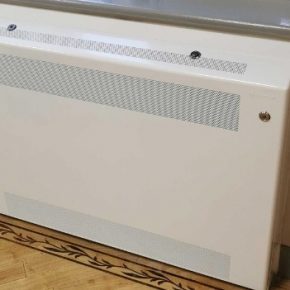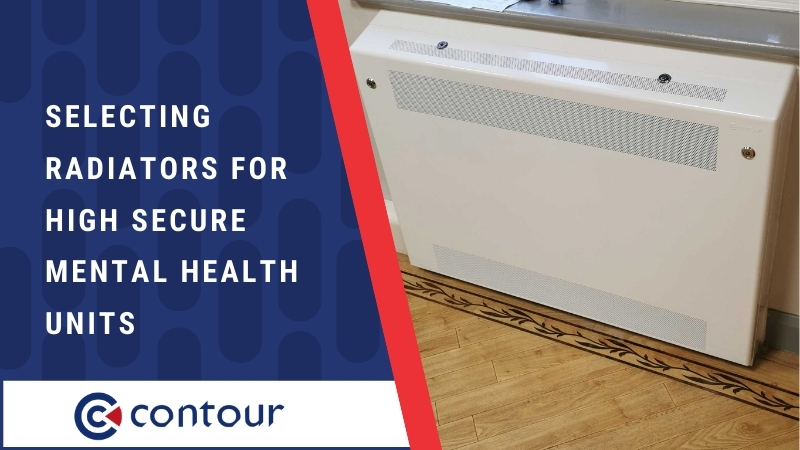
Contour: Selecting Radiators For High Secure Mental Health Units
Psychiatric intensive care units (PICUs) look after patients who cannot be managed on open psychiatric wards due to the level of risk the patient poses to themselves or others. With this in mind, architects and specifiers must ensure a PICU is as secure and comfortable as possible. Contour explain more about selecting radiators in PICUs…

Anti-Ligature Radiators That Offer Durability For High-Secure Mental Health Hospitals
There is a high risk of vandalism, self-harm, and inflicted injuries to others. Therefore, specifiers should consider a radiator that offers the durability and ligature mitigation to withstand the demands of these environments.
When vandalism occurs, users can destruct a heating solution – or any fixture – until there are sharp objects or exposed ligatures. This causes a significant risk to staff and Service Users alike.
It’s important to understand the changes to high-secure mental health facilities over the past few years, with many now offering more freedom to Service Users.
Users have more access to personal belongings and more control over their comfort.
Whilst this extra independence may improve morale in such a facility, it does create more opportunities for Users to carry out acts of vandalism and self-harm.
Bottom line: what was once an appropriately robust radiator or guard may need evaluating to ensure it meets the challenges that modern-day PICUs face.
As service users are bringing more belongings into high-secure mental health units, they are finding more ways to vandalise furniture to inflict self-harm or injury to others.
Behaviour in a PICU can be unpredictable and, therefore, can lead to potentially unsafe situations. To protect all service users, search for an anti-ligature radiator made from 1.5-2mm Zintec steel. For maximum defence, search for a 3mm Zintec steel solution.
The addition of strengthening struts can increase durability too.
Anti-Ligature Radiators In PICU’s
Architects and specifiers are constantly searching for ways to reduce the risk of self-harm and suicide in custodial settings, and it’s especially important for PICUs.
The unpredictable nature of the individuals in PICUs means it’s key that furniture, fixtures, fittings and appliances maintain safety standards, providing a comfortable, secure, and safe environment.
It’s often the belief that suicide risk comes from ligature points that are above head-height. However, studies show suicides can, unfortunately, occur where ligature points have been below the head or even at waist height.
For this reason, it’s necessary to select a radiator that is anti-ligature to keep all individuals safe and secure.
To guarantee the minimisation of all ligature risks, search for an anti-ligature radiator that follows these certain characteristics:
– Small grilles, (IP3X rated grilles is the recommendation)
– (If wall secured) No large gaps between product and wall
– Minimal gaps or joints
– No sharp edges
– Bullnose, rounded corners
– Security locks and fixings
As service users gather their belongings, risks increase in storing contraband in stash points. With anti-ligature radiators, the risk of stash points will be significantly lower, to further protect all users.
Contour Conclusion
To ensure security in PICUs as a specifier or an architect, search for an anti-ligature radiator that is built to withstand vandalism and is safer in terms of anti-ligature risks.
Contour anti-ligature radiators are made in Zintec protected steel in various gauges from 1.5mm-3mm to offer a strong, durable heating solution.
If your PICU needs extra strength, Contour can provide a strengthening strut to provide additional depth and protection.
For anti-ligature features, Contour’s radiators can be anti-ligature with safe edges and IP3x grilles to reduce injuries.
All radiators come with a five year warranty against defects in workmanship and materials for five years from purchase date.
Contour can be contacted at;
The Mansions
43 Broadway
Shifnal
TF11 8BB
Tel: 01952 290 498
Email: sales@contourheating.co.uk
Visit Supplier's page
Latest news

11th April 2025
Don’t Do a Dave! It’s Time to Lock FIT Show 2025 in Your Calendar!
It’s that time again – FIT Show is back! You could be forgiven for thinking there won’t be much new to see when FIT Show returns to the NEC from 29 April – 1 May. Wrong!
Posted in Articles, Building Industry Events, Building Industry News, Building Products & Structures, Building Services, Continuing Professional Development (CPD's), Exhibitions and Conferences, Information Technology, Innovations & New Products, Restoration & Refurbishment, Retrofit & Renovation, Seminars, Training
11th April 2025
Insight Data: Boost construction success with project and prospect data
For those working in construction – in whatever capacity – the last few years haven’t been much fun. And according to the latest statistics, it would seem the challenges are continuing – Alex Tremlett, Insight Data’s Commercial Director, has more…
Posted in Articles, Building Industry News, Building Services, Information Technology, news, Research & Materials Testing
11th April 2025
ASSA ABLOY EMEIA: Learn how to tackle the security challenges of digitalising access with insights from industry experts
In a new series of videos, experts in various specialisms within ASSA ABLOY share their expertise on digital access, including the complexities to overcome and the range of benefits for those who get digital access right…
Posted in Access Control & Door Entry Systems, Architectural Ironmongery, Articles, Building Industry News, Building Products & Structures, Building Services, Doors, Facility Management & Building Services, Information Technology, Innovations & New Products, Posts, Restoration & Refurbishment, Retrofit & Renovation, Security and Fire Protection, Videos
10th April 2025
Geberit completes 150 Acts of Kindness
Geberit has raised nearly £14,000 for various charities through its ‘150 Acts of Kindness’ initiative, a year-long programme of fundraising and volunteering to mark the company’s 150th anniversary in 2024.
Posted in Articles, Bathrooms & Toilets, Bathrooms, Bedrooms & Washrooms, Building Industry Events, Building Industry News, Building Products & Structures, Building Services, Charity work, Drainage, Interiors, Pipes, Pipes & Fittings, Plumbing, Restoration & Refurbishment, Retrofit & Renovation
 Sign up:
Sign up: